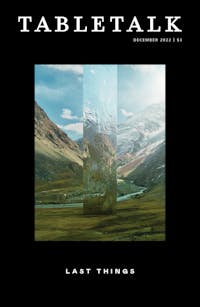
Request your free, three-month trial to Tabletalk magazine. You’ll receive the print issue monthly and gain immediate digital access to decades of archives. This trial is risk-free. No credit card required.
Try Tabletalk NowAlready receive Tabletalk magazine every month?
Verify your email address to gain unlimited access.
What will our heavenly existence be like? Some have envisioned believers as having an ethereal disembodied existence in which we float on clouds and strum on harps, but this picture does not fit with the biblical witness. The Scriptures teach that believers will be raised from the dead (1 Cor. 15:12–19; 1 Thess. 4:13–18) and that we will have physical bodies forever. Resurrected bodies can’t exist without a place, however, and thus there must be a new world that we will inhabit. We are not surprised, then, to discover the promise that there will be a new creation (Isa. 65:17; 66:22; Rev. 21:1), a new world that is free from sin. “The first heaven and the first earth” will pass away, and “the sea [will be] no more” (Rev. 21:1), and then the new creation will come.
The removal of the sea doesn’t mean that there won’t be waters or seas in the new creation. The sea stands symbolically for chaos, for evil, for all that deforms and defaces the present world. The cleansing of the world from evil accords with Romans 8:18–25, where we find that in the present time the created world groans and is full of futility. We see such futility and groaning with tornadoes, tsunamis, hurricanes, earthquakes, floods, and other natural evils. The world that God created is good (Gen. 1:1–31), but Romans 8:18–25 teaches that when Adam sinned, both the human race and the created world were marred by sin. Of course, creation itself didn’t sin, but the sin of Adam was not restricted to him. It also affected the world that he had been commissioned to care for and steward. When Adam fell, the world fell with him, and thorns and thistles sprang up (Gen. 3:18). We see in Romans 8, however, that the futility and fallenness of the present world will come to an end.
We look forward, then, to a world in which God “will wipe away every tear from their eyes, and death shall be no more, neither shall there be mourning, nor crying, nor pain anymore, for the former things have passed away” (Rev. 21:4). Isaiah communicates the same truth: “The wolf and the lamb shall graze together; the lion shall eat straw like the ox, and dust shall be the serpent’s food. They shall not hurt or destroy in all my holy mountain” (Isa. 65:25). John communicates the same truth symbolically in Revelation: “Night will be no more” (Rev. 22:5). All that is evil and defiling in this world will vanish. There will be discontinuity and continuity with the world we live in now. We will still reside in a physical universe, but it will be a world cleansed and purified from all sin. Some have interpreted 2 Peter 3:10–13 as teaching that the present world will be annihilated and burned up and then God will create a new universe out of nothing. This interpretation is certainly possible, but it is more likely that we should understand the burning to denote purification instead of annihilation so that the present world is purified and cleansed and renovated. Renovation and purification of the present creation fit the pattern we find with the resurrection of the body. Our present bodies aren’t annihilated but are granted new life on the day of resurrection.

The new creation is also described as the new Jerusalem coming from heaven (Rev. 21:2). The heavenly city is described as a temple (21:9–22:5) and as a perfect cube (21:16), just like the Most Holy Place in the temple (1 Kings 6:20). The most wonderful feature of the new creation is God’s presence, and then the entire world will be His temple, His dwelling place. We will enjoy a new physical world swept clean from all sin, and when we consider the beauty of the world we live in now, the splendor of what awaits us staggers our imaginations. We will be astonished and marvel at the new creation. But the greatest gift is God Himself. God will be our God and will be with us, and we “will see his face” (Rev. 21:3; 22:4). Our fellowship with and enjoyment of God will far surpass our experience in this life, and we will sing for joy for the created world and for our great triune God—Father, Son, and Holy Spirit.
